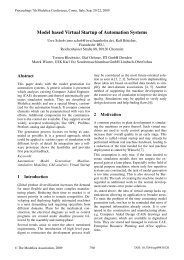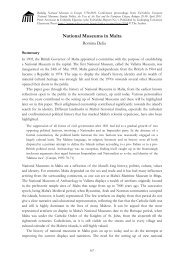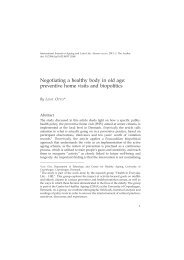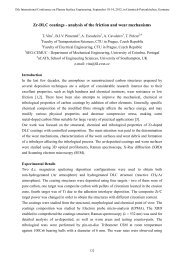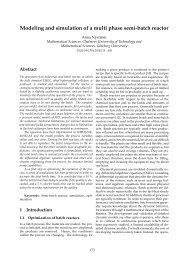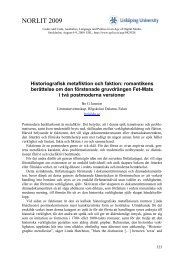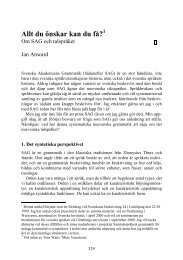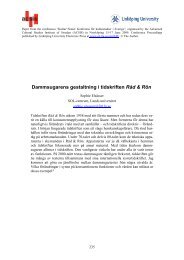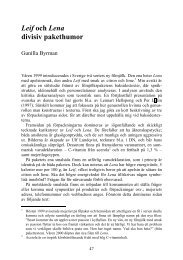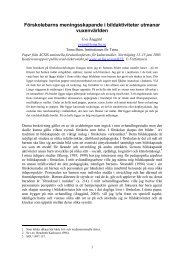- Page 1 and 2:
Kulturstudier i Sverige Nationell f
- Page 3 and 4:
Innehållsförteckning Plenarförel
- Page 5 and 6:
Martin Hultman Att (be)skriva verkl
- Page 7 and 8:
Magnus Persson Kulturaliseringen av
- Page 9 and 10:
Kulturstudiernas brott och broar Jo
- Page 11 and 12:
drabbande som först grundligt för
- Page 13 and 14:
ehövas. Ett brett samlande forum o
- Page 15 and 16:
sedan åtskilliga decennier omtalad
- Page 17 and 18:
Denna reservation hindrar inte att
- Page 19 and 20:
tingen postkoloniala eller mer elle
- Page 21 and 22:
Kulturellt slitage Orvar Löfgren E
- Page 23 and 24:
åldrande tingen och de få kvarlev
- Page 25 and 26:
Han är bara en i raden för vilka
- Page 27 and 28:
för något annat än sig själf”
- Page 29:
Noter 1. Ett stort tack till Gösta
- Page 32 and 33:
arbetets gång har jag slagits av h
- Page 34 and 35:
Susanne: Tjejer kan ha kakigrönt.
- Page 36 and 37:
Bilder av genus, bilder av jämstä
- Page 38 and 39:
Referenser Ambjörnsson, Fanny (200
- Page 40 and 41:
dem som konstkritikerna i främst h
- Page 42 and 43:
Institutionell konsekration Regiona
- Page 44 and 45:
men inte främst i vertikal riktnin
- Page 46 and 47:
Många av dessa konstnärers framst
- Page 48 and 49:
ordade, fragmentariska verk. Några
- Page 50 and 51:
Flera av dem har under utbildningst
- Page 52 and 53:
Referenslista Barbro Andersson (199
- Page 54 and 55:
(…) man kan se på det som sitt h
- Page 56 and 57:
Det jag slutligen vill lyfta fram h
- Page 58 and 59:
Vi har alla tillgång till det offe
- Page 60 and 61:
Schablonteknik och taggar på imped
- Page 62 and 63:
nat, med eller utan estetisk medvet
- Page 64 and 65:
Blandade verk. Foto: Cecilia Anders
- Page 66 and 67:
ellt vad som syns var i staden, vil
- Page 68 and 69:
Avslutande ord - konfliktdiskussion
- Page 71 and 72:
”Det kommer inga duvungar blå ur
- Page 73 and 74:
vid namn, som sitt straff tåligt u
- Page 75 and 76:
På en viss dag med stort misshag,
- Page 77 and 78:
Hönsen är visserligen offer för
- Page 79 and 80:
ott. Vidare jämförs med djur som
- Page 81 and 82:
Social reproduktion av hantverk i t
- Page 83 and 84:
jägare-samlare organiserar sig: d.
- Page 85 and 86:
Kooperativa former av släktskapsba
- Page 87 and 88:
Tabell 1. Den geografiska fördelni
- Page 89 and 90:
Långtidsminne Deklarativt minne Ic
- Page 91 and 92:
(1) Lärlingen lär sig förbereda
- Page 93 and 94:
syssla. Å andra sidan har det påp
- Page 95:
Lomborg, E., 1973. Die flintdolche
- Page 98 and 99:
as a product created out of human l
- Page 100 and 101:
The Original The first daguerreotyp
- Page 102 and 103:
The enigmatic attraction of the pho
- Page 104 and 105:
even grumble at those, at the one f
- Page 106 and 107:
The Pleasure of the Surface In a le
- Page 108 and 109:
Selected references Bachen, Geoffre
- Page 110 and 111:
och inte musikens relation till lyr
- Page 112 and 113:
Biografer och bilfärder Ordet biog
- Page 114 and 115:
I ett par dikter från de senare di
- Page 116 and 117:
skriva orden ”det sjuka öde land
- Page 119 and 120:
Med ögat i kameran - sätt att stu
- Page 121 and 122:
innan änglar och smådjävlar dela
- Page 123 and 124:
kvinnliga sätt att vara (Diamond,
- Page 125 and 126:
egna blickar dra in deras blickar.
- Page 127:
Referenser Axelsson, Bodil. (2003):
- Page 130 and 131:
De tidiga framsteg som gjordes med
- Page 132 and 133:
omöjlig. Av nödvändighet är den
- Page 134 and 135:
Även i Lisa Tuttles novell ”Worl
- Page 136 and 137:
”kommer helt enkelt att vara en s
- Page 138 and 139:
Silver, Lee M. (1998 (1997)): Kloni
- Page 140 and 141:
Lotta: Du nämnde ju det här med s
- Page 142 and 143:
erna och lyfter istället fram dess
- Page 144 and 145:
Persson visar i Populärkulturen oc
- Page 146 and 147:
lerat ger de, liksom i Lpf -94, int
- Page 148 and 149:
nas verklighet t.ex. Aino Trosells
- Page 150 and 151:
studiebesök på teatern. Eleverna
- Page 152 and 153:
som dom inte kan tänkas uppleva.
- Page 154 and 155:
gör hon nedslag och det är inte l
- Page 156 and 157:
Litteratur Andersson, Lars Gustaf,
- Page 158 and 159:
starkt. Ganetz menar dessutom att a
- Page 160 and 161:
sitt liv, eftersom duet är en del
- Page 162 and 163:
kan uppfattas som att varje själ,
- Page 164 and 165:
Nära sammanhängande med detta är
- Page 166 and 167:
varit att försöka spåra Dahlgren
- Page 168 and 169:
Referenser Eva Dahlgren (2000): Fö
- Page 171 and 172:
Out of the Salon Katarina Bonnevier
- Page 173 and 174:
slightly off center, along the righ
- Page 175 and 176:
tea and Catalans, a sweet pastry wi
- Page 177 and 178:
frames”. 10 The status of the het
- Page 179:
References Djuna Barnes (1922): Dam
- Page 182 and 183:
mer sig att det gått så pass bra.
- Page 184 and 185:
I och med att examensrättigheterna
- Page 186 and 187:
Traditionell, skulle jag vilja säg
- Page 188 and 189:
gonsamlingar, samkväm och alla gem
- Page 191 and 192:
Mme de Staëls självbiografiska re
- Page 193 and 194:
Detta har naturligtvis redan gjorts
- Page 195 and 196:
Den kanoniska modellen och dess utv
- Page 197 and 198:
däremot förekommer i anteckningar
- Page 199 and 200:
dévorer moi-même.” 28 Möjligen
- Page 201 and 202:
flera ställen. Så här skriver Mm
- Page 203 and 204:
måste också tas till relationer o
- Page 205 and 206:
Det kulturella verktyget både begr
- Page 207:
Searle, John (1999): Mind, language
- Page 210 and 211:
physical environment as a narrative
- Page 212 and 213:
ecological baby food HIPP, and Whir
- Page 214 and 215:
Hence, the visitors and the staff c
- Page 216 and 217:
also turned into an intertwined web
- Page 219 and 220:
”Jag känner mig lite manlig när
- Page 221 and 222:
Ser man till de intervjuades person
- Page 223 and 224:
C: Från flickor och så har det al
- Page 225 and 226:
och social förändring, alternativ
- Page 227 and 228:
Vardagsestetik, sinneserfarenhet oc
- Page 229 and 230:
termer av kroppsliga upplevelser bl
- Page 231 and 232:
hon använder för matlagning ges e
- Page 233:
Referenser Grosz, Elizabeth, 1994.
- Page 236 and 237:
Den estetiska vändningen, så som
- Page 238 and 239:
En intressant iakttagelse är dock
- Page 240 and 241:
Referenser Armstrong, Isobel (2000)
- Page 242 and 243:
och beskyddare. Själen, människan
- Page 244 and 245:
medium och genre med speciella trad
- Page 246 and 247:
normer för annat socialt samspel (
- Page 248 and 249:
collection of possibilities for ide
- Page 250 and 251:
Referenser Otryckt RA, Börstorpssa
- Page 253 and 254:
The power of connections: on durabi
- Page 255 and 256:
a sign on the counter, stating the
- Page 257 and 258:
floating out on the street. Carl is
- Page 259 and 260:
Joakim: But how do you get to such
- Page 261 and 262:
Thickening the plot: the planner tr
- Page 263 and 264:
stress through these examples is th
- Page 265 and 266:
Hamlet eller Hamilton? Litteraturve
- Page 267 and 268:
Vinci-koden når ut på ett helt an
- Page 269 and 270:
framgår av att forskare kan syssla
- Page 271 and 272:
om som René Wellek. 33 Också Hora
- Page 273 and 274:
decennierna har textbegreppet kommi
- Page 275 and 276:
textanalysens storhetstid i Sverige
- Page 277 and 278:
En god författare är en död för
- Page 279 and 280:
ningsökningen framöver. Delvis be
- Page 281 and 282:
minst Strindbergs uppgörelse med i
- Page 283 and 284:
arkiska ståndsamhället, och passa
- Page 285 and 286:
dande social framgång. Genombrotte
- Page 287 and 288:
som nu jublar hånfullt mot vanligt
- Page 289 and 290:
självklara fora för de etablerade
- Page 291 and 292:
dessutom lyckades engagera den tidi
- Page 293 and 294:
Det man däremot kan fråga sig är
- Page 295 and 296:
Referenser Agrell, Alfhild (”Thyr
- Page 297 and 298:
Vägen tillbaka Erfarenheter av mor
- Page 299 and 300:
Pain fills my days, the ache in my
- Page 301 and 302:
Debbie och hennes man hade ett rikt
- Page 303 and 304:
Detta förfrämlinggörande har åt
- Page 305 and 306:
hade tänkt köpa marijuana. Istäl
- Page 307 and 308:
Till och med i avrättningsrummet f
- Page 309 and 310:
Bibelordet. Nio månader efter min
- Page 311 and 312:
”leave this territory” (Arendt,
- Page 313 and 314:
Sonjas samling Att rekonstruera ett
- Page 315 and 316:
den vita ormen i formalin eller den
- Page 317 and 318:
att det var en påse med ett slags
- Page 319 and 320:
om sådant som hänt på arbetsplat
- Page 321:
Källor och litteratur Blom, K Arne
- Page 324 and 325:
this single space of communication
- Page 326 and 327:
tendency that probably infects the
- Page 328 and 329:
it. This move could enable us to th
- Page 330 and 331:
organizing of contemporary social m
- Page 332 and 333:
possible” 35 , are then identifie
- Page 334 and 335:
Websites http://www.forumsocialmund
- Page 336 and 337:
utredningar (SOU-serien) och av de
- Page 338 and 339:
erättelse om Sverige som tekniskt
- Page 340 and 341:
möjligt får del av och deltar i d
- Page 342 and 343:
partierna. Ny demokrati menade att
- Page 344 and 345:
IT i kulturens sjänst Även den st
- Page 346 and 347:
att förhindra uppkomsten av nya kl
- Page 348 and 349:
Referenslista Litteratur Anderson,
- Page 350 and 351:
Statens offentliga utredningar (SOU
- Page 352 and 353:
den intressant att undersöka närm
- Page 354 and 355:
en Laura Mulveys teori om the male
- Page 356 and 357:
heteronormativa kulturen alltid ”
- Page 358 and 359:
Referenser Butler, Judith (1999/199
- Page 360 and 361:
tiska tidningarna inte gav utrymme
- Page 362 and 363:
lugnar ’borgarna’, av de mycket
- Page 364 and 365:
Kanske också ett utslag av ”för
- Page 366 and 367:
Referenser Bladh, Curt: ”Från bo
- Page 368 and 369:
investigate how a society conceptua
- Page 370 and 371:
possible, with increasingly restric
- Page 372 and 373:
ences from literature, information
- Page 374 and 375:
poiesis, autocatalysis and emergent
- Page 376 and 377:
focusing on creating the artist rat
- Page 379 and 380:
Att (be)skriva verkligheten - ett f
- Page 381 and 382:
ger upphov till den moderna tidens
- Page 383 and 384:
pel på två sådana sammansättnin
- Page 385 and 386:
Kritik av ANT Flertal kritiska komm
- Page 387 and 388:
De regelbundenheter som Foucault ta
- Page 389 and 390:
de har dock alltid en historicitet
- Page 391 and 392:
upphävande av, distinktionen mella
- Page 393 and 394:
skaplig metafor, att samhällen ida
- Page 395 and 396:
Thus, the norm structures the fanta
- Page 397 and 398:
alismen ifrågasatts och teoretiker
- Page 399 and 400:
[…] en tung drivkraft bakom utvec
- Page 401 and 402:
Referenser Böcker och artiklar Ams
- Page 403 and 404:
Law, John & Urry, John (2004), “E
- Page 405 and 406:
Att vara ett fritt flytande subjekt
- Page 407 and 408:
godhetsstämpel och ett vänsterlib
- Page 409 and 410:
ursprungsbefolkningar och minoritet
- Page 411 and 412:
nande asiatiska kvinnan och den tö
- Page 413 and 414:
och koreaner. Denna essentialiserin
- Page 415 and 416:
Who am I if I’m not white enough
- Page 417 and 418:
Referenser och referenslista Primä
- Page 419:
Sarri, Rosemary C., Yeonoak Baik oc
- Page 422 and 423:
of memory and the past on the one h
- Page 424 and 425:
alltså gott om fragment av andra t
- Page 426 and 427:
En av figurerna som nämns tämlige
- Page 428 and 429:
Referenser Filosofilexikonet (Stock
- Page 430 and 431:
följeslagare. Intervjuer, observat
- Page 432 and 433:
Experiment 2: Ett misslyckat deltag
- Page 434 and 435:
”rasmässigt” relativt blandad
- Page 436 and 437:
Till slut insåg vi att det nog int
- Page 438 and 439:
att styra val av teori och analytis
- Page 440 and 441:
Referenser de Certeau, Michel (1984
- Page 442 and 443:
tekstanalyser af uddannelsesdokumen
- Page 444 and 445:
Identitetskort på gulvet. Identite
- Page 446 and 447:
et mere eksplicit politisk indhold,
- Page 448 and 449:
sub-struktur/kultur at støtte sig
- Page 451 and 452:
HYBRID-TV Populärkulturens roll i
- Page 453 and 454:
såväl inslag från valvakor som s
- Page 455 and 456:
fon än t.ex. en naturvetenskaplig
- Page 457 and 458:
friställning. Då kvinnor blir gra
- Page 459:
Intervjuer och enkäter Intervju 1
- Page 462 and 463:
Källmaterialet De kassettband som
- Page 464 and 465: Trots att intentionen här är god
- Page 466 and 467: Markus: Nej. Så ni har inte behöv
- Page 468 and 469: När min kollega P inom den vårdve
- Page 470 and 471: erfarenheter av väntelistan för n
- Page 472 and 473: Christer berättade om maskinen och
- Page 474 and 475: kvittade det hur många gånger jag
- Page 476 and 477: Referenser Arnstberg, Karl-Olov (19
- Page 478 and 479: kreationer som äger verklighet jus
- Page 480 and 481: diskursivt till gammal men nyaktual
- Page 482 and 483: deckare, där tre raska gossar, med
- Page 484 and 485: på ett allt annat positivt sätt v
- Page 486 and 487: händertagande, milda och djupt gud
- Page 488 and 489: Det folkliga skrattet över Kejsare
- Page 490 and 491: Werbner, Pnina (2002): “The place
- Page 492 and 493: tial production. As indicated in Le
- Page 494 and 495: etween texts and contexts, hyper-sp
- Page 496 and 497: the ephemerality of text-context re
- Page 498 and 499: not the same as thinking of communi
- Page 500 and 501: Studying textures, then, is not mer
- Page 502 and 503: The subject experiences space as an
- Page 504 and 505: ‘material turn’ discussed in th
- Page 506 and 507: Marcus, George, E and Michael M J F
- Page 508 and 509: problems. 1 Many consider public pa
- Page 510 and 511: Theoretical points of departure The
- Page 512 and 513: discussions, decision-making and im
- Page 516 and 517: knowledge of soil processes as well
- Page 518 and 519: gave a good basis for discussion wi
- Page 520 and 521: meetings were also seen to have inc
- Page 522 and 523: give unsatisfied stakeholders (grou
- Page 524 and 525: References Alkan Olsson, J., Berg,
- Page 526 and 527: Swedish Municipalities. Novemus, Ö
- Page 528 and 529: Kulinarisk kunskap på olika arenor
- Page 530 and 531: Referenser Ekström, Pipping Marian
- Page 532 and 533: I tillegg innebærer moderniteten e
- Page 534 and 535: Formålet med å gjennomføre en sp
- Page 536 and 537: veteranbiler eller Amcars. Den oppb
- Page 538 and 539: Avis II: Pitebor är kända för m
- Page 540 and 541: ilmusikerne, som hadde gratis adgan
- Page 543 and 544: Delaktighet - ett värde i vården
- Page 545 and 546: Uses a team approach to address the
- Page 547 and 548: det kraftigt av spyor, och ju närm
- Page 549 and 550: spruta, att droppet fungerar som de
- Page 551 and 552: pratat med Axel om att bli inskrive
- Page 553 and 554: var så sjuk eller tog så mycket m
- Page 555 and 556: The rebirth of the museum spänning
- Page 557 and 558: museets arbete med att integrera sa
- Page 559 and 560: ikta blickarna mot den egna histori
- Page 561 and 562: otypes fast and loose, until all si
- Page 563 and 564: omkring oss kräver mycket av chefe
- Page 565 and 566:
Postmodern apokalyps? Om mytiska sy
- Page 567 and 568:
speciellt symbolisk, då den kultur
- Page 569 and 570:
du/spelaren är den amerikanske eli
- Page 571 and 572:
sin chefs mysticism och stora intre
- Page 573 and 574:
den försvunna skatten, 1981), vilk
- Page 575 and 576:
soner sade, på tal om historisk sa
- Page 577 and 578:
Referenser Arvidsson, Stefan (2000)
- Page 579:
Stockholm: Verbum 1967. Wegener, Be
- Page 582 and 583:
kontakter med Chile respektive Kurd
- Page 584 and 585:
möjlighet att återvända. Den egn
- Page 586 and 587:
Att tillhöra just det, känsla att
- Page 588 and 589:
träffade socialsekreteraren, för
- Page 590 and 591:
faktiskt svenskarna som har tagit h
- Page 592 and 593:
Referenser Anderson, Benidict (1997
- Page 595 and 596:
LUST, LAST OCH LAGBROTT Könsköpar
- Page 597 and 598:
som regelbundet köper prostituerad
- Page 599 and 600:
aggressionen, den som samhället f
- Page 601 and 602:
att de utövar makt över andra ell
- Page 603:
Litteratur Aarseth, H & Olsen, B M
- Page 606 and 607:
och ett internt prästerskap som s
- Page 608 and 609:
kriterier och skrivsätt som utmär
- Page 610 and 611:
”kommersiella tomrum” 11 som r
- Page 612 and 613:
lev en krönika (26.01) skriven i e
- Page 614 and 615:
60-talsrock nedvärderas (Dylans Hi
- Page 616 and 617:
Referenser Böcker Erling Bjurströ
- Page 619 and 620:
Gestaltning, konstruktion och menin
- Page 621 and 622:
till de representationer som når o
- Page 623 and 624:
Den narrativa tråd som tjejerna se
- Page 625 and 626:
Leeuwen beskriver, beroende av var
- Page 627 and 628:
För att återknyta till vårt omr
- Page 629 and 630:
De kan själva i hög grad sägas h
- Page 631:
Culture. Oxford: Oxford University
- Page 634 and 635:
För det andra: Hur kan vi förstå
- Page 636 and 637:
under hans beskydd? Hans svar var:
- Page 638 and 639:
noverar en husvagn, inreder sitt he
- Page 640 and 641:
var avsaknaden av det som upplevdes
- Page 642 and 643:
Referenser Arendt, Hanna (1998): M
- Page 644 and 645:
Int: Välkomna till Stadio utt. Har
- Page 646 and 647:
[Kokko gör ett ljud som låter som
- Page 648 and 649:
eteckna inre skönhet? I studion be
- Page 650 and 651:
andra former av tänkande kring des
- Page 652 and 653:
Referenser Bachtin, Michail (1986):
- Page 654 and 655:
också problematiskt då det risker
- Page 656 and 657:
därmed in henne in i en modern org
- Page 658 and 659:
Referenser Alvesson, Mats (1998): K
- Page 660 and 661:
Inledning Exploration is the physic
- Page 662 and 663:
I maj år 2000 seglade den brittisk
- Page 664 and 665:
drar till detta. De svenska resenä
- Page 666 and 667:
huge draw for whalers and trappers
- Page 668 and 669:
Visuell kultur är en viktig del i
- Page 670 and 671:
När det gäller Andréeresorna run
- Page 672 and 673:
Referenser Bravo, Michael & Sörlin
- Page 674 and 675:
främmande, han konstruerar den kul
- Page 676 and 677:
Tänder med glädje dem an och låt
- Page 678 and 679:
det är en konstgjord, maskerad och
- Page 680 and 681:
Ehuru dessa resor i främsta rummet
- Page 682 and 683:
håll: låg panna, själlös blick,
- Page 684 and 685:
och därför räknas t.ex. Slovenie
- Page 686 and 687:
Zagreb tillhör Centraleuropa, ett
- Page 689 and 690:
”Gudablodets Kraft”: Jesu offer
- Page 691 and 692:
Påverkan från den sekulära heavy
- Page 693 and 694:
Under början 1980-talet splittrade
- Page 695 and 696:
kulturen. Med tiden utvecklades doc
- Page 697 and 698:
Ovanstående utdrag lyfter fram fle
- Page 699 and 700:
I alla tre ovanstående utdrag kan
- Page 701:
Intervjumaterial E-post korresponde
- Page 704 and 705:
En, två eller tre knappar. Affärs
- Page 706 and 707:
och samlat i tal eller skrift, det
- Page 708 and 709:
dom. Detta garvade styrelseproffs b
- Page 710 and 711:
Collinson, David L. och Hearn, Jeff
- Page 712 and 713:
svenska alkoholpolitiken, finns det
- Page 714 and 715:
att rikta uppmärksamheten till alk
- Page 716 and 717:
det är att människors kritiska me
- Page 718 and 719:
namn och för kärleken till nästa
- Page 720 and 721:
var måste ”göra sig till granne
- Page 722 and 723:
Jag när, liksom etnologen Lena Mar
- Page 724 and 725:
Referenser Andersson, Berit, 1999.
- Page 727 and 728:
Brottsoffer. Offerskapets innebörd
- Page 729 and 730:
flickans hemstad tog hon inte händ
- Page 731 and 732:
I intervjuerna kan också informant
- Page 733:
Referenser Barley, James, 1991: ”
- Page 736 and 737:
er och mode, som historikern Christ
- Page 738 and 739:
nom kan den stigmatiserande fjoll-
- Page 740 and 741:
ätta frisyren” (s.74). Vid varje
- Page 743 and 744:
Danske producenter af det som kalde
- Page 745 and 746:
Bourdieu opererer således ikke med
- Page 747 and 748:
I forbindelse med afhandlingsarbejd
- Page 749 and 750:
749 HFH EA FH PD-L ORi Figur 2: Pr
- Page 751 and 752:
Et sådant brud (og en dertil knytt
- Page 753 and 754:
handlinger, dvs. anvendelse/implika
- Page 755 and 756:
eringsforskning«, konstrueres som
- Page 757 and 758:
efereres i det mindste en producent
- Page 759 and 760:
Ledarskap och relation - beskrivnin
- Page 761 and 762:
ete som krävs för att utföra en
- Page 763 and 764:
nen sitter vid trumsetet och spelar
- Page 765 and 766:
verket faktiskt rör sig om en exak
- Page 767:
Referenser Barret, Frank J. (1999):
- Page 770 and 771:
läggande förutsättning för arbe
- Page 772 and 773:
materialiserade på så sätt dröm
- Page 774 and 775:
Idag är feminismen som politiskt f
- Page 777 and 778:
Kulturaliseringen av litteraturstud
- Page 779 and 780:
form av eftersläpning som tillspet
- Page 781 and 782:
jämfört med exempelvis när jag s
- Page 783 and 784:
tur, sångtexter, barnböcker, krim
- Page 785 and 786:
pande kulturalisering av ämnet. 30
- Page 787 and 788:
aturundervisningens disponering, f
- Page 789 and 790:
Skönlitteratur, film och teater ge
- Page 791 and 792:
tionaliserande genom betoningen av
- Page 793 and 794:
kunskapers kulturellt och historisk
- Page 795 and 796:
Lgy 70, Läroplan för gymnasieskol
- Page 797 and 798:
”Då gick jag in i väggen” Om
- Page 799 and 800:
erättelse bortser jag till viss de
- Page 801 and 802:
utom en monetär ersättning, vilke
- Page 803 and 804:
Till skillnad från i visioner om f
- Page 805:
Referenser Baker, Tom (2002) Risk,
- Page 808 and 809:
ygg. Det är bra för kroppen att h
- Page 810 and 811:
Anna är uppenbarligen inte ensam o
- Page 812 and 813:
sad. ”Du behöver inte gömma dig
- Page 814 and 815:
Referenser Bordo, Susan, 1993. Unbe
- Page 816 and 817:
mest kända och populära personlig
- Page 818 and 819:
arna. Naturligtvis går det att vid
- Page 820 and 821:
Antropologiprofessorerna George E.
- Page 822 and 823:
försvara den strukturen när det h
- Page 824 and 825:
Referenser Bogdan, Robert (1988): F
- Page 827 and 828:
Vi ska äta, vem ska laga? Författ
- Page 829 and 830:
skap, om kloka matval. Frågor om r
- Page 831 and 832:
Tabell 2. Genomsnittlig tid för st
- Page 833:
Referenser Ahrne, Göran & Roman Ch
- Page 836 and 837:
varandra utan att kultur kan reduce
- Page 838 and 839:
en rad olikartade betydelser och s
- Page 840 and 841:
när de väl anlänt till Sverige.
- Page 842 and 843:
statligt finansierade kulturinstitu
- Page 844 and 845:
En tredje hindrande mekanism av str
- Page 846 and 847:
I beskrivningarna av de andra mejsl
- Page 848 and 849:
det till att upprätthålla olikhet
- Page 850 and 851:
Integrationsverket (2003): Rapport
- Page 852 and 853:
sin yttersta grund i att upplösnin
- Page 854 and 855:
språkliga praktiker, snarare än a
- Page 856 and 857:
des som. I framtiden kunde den fung
- Page 858 and 859:
forskning som bedrivits med detta p
- Page 861 and 862:
En kvinnlig forskares karriär och
- Page 863 and 864:
fokus på versmått, verslära och
- Page 865 and 866:
Abenius har betecknats som särskil
- Page 867 and 868:
tachment’”). 25 Den sortens ide
- Page 869:
Källor och litteratur Otryckt mate
- Page 872 and 873:
på distans 2 projektet som handlad
- Page 874 and 875:
hur etnografin fungerar inom human-
- Page 876 and 877:
veckling kan vi redan idag börja s
- Page 878 and 879:
Referenser Anderson, R. J. (1994):
- Page 881 and 882:
På vandring i naturens teater - Na
- Page 883 and 884:
vecklingslinje från de ”lägsta
- Page 885 and 886:
den skräckinjagande, fascinerande
- Page 887 and 888:
I interaktiva stationer testas krop
- Page 889 and 890:
ningar. Denna ”atomism” kan doc
- Page 891 and 892:
Postmoderna tecken men… Våren 20
- Page 893 and 894:
trivsam liten stuga, inbäddad i mj
- Page 895 and 896:
poetisk ton, som förstärks med de
- Page 897 and 898:
Tjädern Vi ser ett diorama med en
- Page 899 and 900:
(………...) Tålig eller dålig
- Page 901 and 902:
historia 70 Men jag vill snarare ly
- Page 903 and 904:
Ett objekt som skulle få många ku
- Page 905 and 906:
Referenser Ariès, Philippe. Images
- Page 907 and 908:
Konsten att gunga: Om upprepning Mo
- Page 909 and 910:
skrivning av en närvarande verklig
- Page 911 and 912:
Repetition som skillnad I Deleuze b
- Page 913 and 914:
den. Heidegger menar att ’bron sk
- Page 915 and 916:
Det kan se ut som om att sitta stil
- Page 917 and 918:
och därmed förkorta tiden för re
- Page 919 and 920:
god handling. De skillnader vi uppr
- Page 921 and 922:
Referenser Anderson, Laurie, Big Sc
- Page 923 and 924:
Professorn och kärleken Sexuellla
- Page 925 and 926:
För att åskådliggöra detta komm
- Page 927 and 928:
sig i en bekännelseakt av religiö
- Page 929 and 930:
Det andra performativa talet. Falle
- Page 931 and 932:
Även i Camus’ roman Främlingen
- Page 933 and 934:
Därmed tycks den anmälde uppta oc
- Page 935 and 936:
son: ”Så har den alltså kommit,
- Page 937 and 938:
nåden tillbaka. Nota bene dock att
- Page 939 and 940:
Skulptur, klotter och ”motmonumen
- Page 941 and 942:
kvinnliga nakenakten utmärker sig
- Page 943 and 944:
Fig. 5. Eric Grate, Gudinna från h
- Page 945 and 946:
verksskickliga industriarbetare. 13
- Page 947 and 948:
I andra fall består åverkan av vi
- Page 949 and 950:
Fig. 15. Carl Eldh, Simhopparen, Ka
- Page 951 and 952:
Konstnärliga motmonument som inlä
- Page 953:
Referenser Clark, Kenneth (1956), T
- Page 956 and 957:
Våra frågor Studiens inriktning h
- Page 958 and 959:
Studien inkluderade en processtanke
- Page 960 and 961:
i skolan … Fokuseringen i samtlig
- Page 962 and 963:
i ämnesområdena journalistik, med
- Page 964 and 965:
En del av lärarutbildarna tolkar u
- Page 966 and 967:
Möjligheter att knyta an till påg
- Page 968 and 969:
Kompetensutveckling inom lärarutbi
- Page 970 and 971:
Studentlitteratur. Lund Olson, Kris
- Page 972 and 973:
Grundskolans kursplaner och betygsk
- Page 974 and 975:
BILAGA 2 Antal studerande per progr
- Page 976 and 977:
För att få grepp om användningen
- Page 978 and 979:
trafikerade sajt. Lunarstorm är oc
- Page 980 and 981:
Urval För att hitta de 50 krypinen
- Page 982 and 983:
Jag har arbetat induktivt på så v
- Page 984 and 985:
oO_ElinPelin_Oo LillRevan nalle_go_
- Page 986 and 987:
och framhävs på samma sätt som d
- Page 988 and 989:
fram sina romantiska relationer (22
- Page 990 and 991:
privat och offentligt, och att det
- Page 992 and 993:
glidning mellan vänskapliga och ro
- Page 994 and 995:
studie framför allt yttrar sig i k
- Page 996 and 997:
Lang. Lewis, Lisa A. (1993): “Bei
- Page 998 and 999:
kanska studier som främst behandla
- Page 1000 and 1001:
om samhället: ”truth is a slippe
- Page 1002 and 1003:
som kan dölja andra mindre diskurs
- Page 1004 and 1005:
på något ska få utdelning i form
- Page 1006 and 1007:
man tävlar ju alltid med de amerik
- Page 1008 and 1009:
min handstil kontra de där rutorna
- Page 1010 and 1011:
Petra: Då tvingas man kämpa och j
- Page 1012 and 1013:
sera orättvisor och missförhålla
- Page 1014 and 1015:
Schloss, Joseph G. (2004): Making b
- Page 1016 and 1017:
2003. Alla restauranger har en sven
- Page 1018 and 1019:
presenteras tydliggörs endast viss
- Page 1020 and 1021:
en förväntan. Den utgör samtidig
- Page 1022 and 1023:
i kurs. Detta står i motsats till
- Page 1024 and 1025:
Litteratur Bell, D & G Valentine, 1
- Page 1027 and 1028:
Göteborgsdemonstrationer som visue
- Page 1029 and 1030:
de tillfälliga enigheter som uppst
- Page 1031 and 1032:
stera i det offentliga rummet vilka
- Page 1033 and 1034:
Fig. 6.5, Första sidan på DN 16/6
- Page 1035 and 1036:
dessa demonstranter som visiterades
- Page 1037 and 1038:
Granström. Polisen uppfattade de p
- Page 1039 and 1040:
träder som krusters, hardcore, pun
- Page 1041 and 1042:
ovan. Kläderna här är enklare oc
- Page 1043 and 1044:
9. Slutsatsen Många unga är desil
- Page 1045:
Referenser Bal, Mieke och Norman Br
- Page 1048 and 1049:
Startsidan Scannern E-butiken Tryck
- Page 1050 and 1051:
paradise garden. 3 Denna klassiska
- Page 1052 and 1053:
syndromet. Uppställning i tabellfo
- Page 1054 and 1055:
ångrat att han låtit scanna sin D
- Page 1056 and 1057:
tiva samlevnadsideologin och ett kr
- Page 1058 and 1059:
I nästa steg, själva scanningen,
- Page 1060 and 1061:
nom en avdelning för nätkonst. De
- Page 1062 and 1063:
Referenser Andersson, Lennart, ”A
- Page 1065 and 1066:
Ljus över mörka vatten? Gustaf Da
- Page 1067 and 1068:
”öfver hela landet på grund af
- Page 1069 and 1070:
världen” hyste medkänsla med Da
- Page 1071 and 1072:
tydelse.” 34 Svenska Dagbladet fr
- Page 1073 and 1074:
gick Dalén fram till den gastub so
- Page 1075 and 1076:
Dekonstruktiv konst, genus och dåt
- Page 1077 and 1078:
sången och genom att konstnären i
- Page 1079 and 1080:
åt andra berättelser inte bara ge
- Page 1081 and 1082:
Form och innehåll Dekonstruktionen
- Page 1083 and 1084:
Memento vivere: Föremåls betydels
- Page 1085 and 1086:
sorgearbetet. Först är det svårt
- Page 1087 and 1088:
denna länk, men ibland finns det i
- Page 1089 and 1090:
mot sin nya värld och försöker h
- Page 1091 and 1092:
Fältbegreppet vid långa och korta
- Page 1093 and 1094:
sökningen 1911-1912. Som kontroll
- Page 1095 and 1096:
Fältvägen till positionen prins E
- Page 1097 and 1098:
för honom: han var inte, som han s
- Page 1099 and 1100:
kade kapitalförmerande och bidrog
- Page 1101 and 1102:
som tillerkänns ett värde på fä
- Page 1103 and 1104:
konsthistorikern Jonny Roosvals bes
- Page 1105:
Referenser Prins Eugens arkiv (PEA)
- Page 1108 and 1109:
tidpunkten då man blev innehavare
- Page 1110 and 1111:
Center i Göteborg och Moderna muse
- Page 1112 and 1113:
landskapsfotografi som förekommer
- Page 1114 and 1115:
exempel där fotografer och forskar
- Page 1116 and 1117:
Referenser Baart, Theo / Metz, Trac
- Page 1119 and 1120:
Förskolebarns meningsskapande i bi
- Page 1121 and 1122:
ilder (Bachtin, 1991). Genrebegrepp
- Page 1123 and 1124:
ett nyskapande sätt. I ett lärarl
- Page 1125 and 1126:
Bild 1: Nina, 5:1 (fiberspetspenna
- Page 1127 and 1128:
Att lära sig av andra barn Ett ann
- Page 1129 and 1130:
Mallar - hjälpmedel att göra någ
- Page 1131 and 1132:
Bild 9: Fredrik, 6:1, Elias, 5:8 oc
- Page 1133 and 1134:
personalen inför mig. De vet att d
- Page 1135 and 1136:
motståndskulturer, som ett sätt a
- Page 1137 and 1138:
Referenser Alanen, Leena (2001):
- Page 1139:
Barnomsorg och Skolakommittén) Sto
- Page 1142 and 1143:
Inom ämnet religionssociologi i Sv
- Page 1144 and 1145:
del Sagan om ringen (2001, 2002 och
- Page 1146 and 1147:
Inom religionsbeteendevetenskaplig
- Page 1148 and 1149:
Instead of falling into ’multiphr
- Page 1150 and 1151:
En speciell roll av tillägnad kara
- Page 1152 and 1153:
Peter lyfter fram Sam som verkligen
- Page 1154 and 1155:
Masken och rädslan tar mycket ener
- Page 1156 and 1157:
kognitiva föreställningar kring p
- Page 1158 and 1159:
Rydin, Ingegerd, (1998) “How Chil
- Page 1160 and 1161:
är mer satt på boendets existenti
- Page 1162 and 1163:
och inte som åskådare. Det var i
- Page 1164 and 1165:
dagligen: inget passande av spisen
- Page 1166 and 1167:
Referenser Attfield, Judy (2000): W



